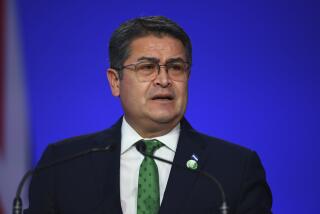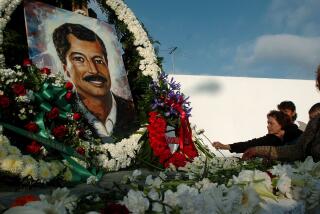Argentine judge dismisses criminal case against President Fernandez
Reporting from Buenos Aires — An Argentine judge Thursday tossed out a criminal case against President Cristina Fernandez de Kirchner that had been brought by a prosecutor who later died under mysterious circumstances.
The prosecutor accused the president of conspiring to protect Iranian officials from prosecution in the 1994 bombing of a Jewish community center in Buenos Aires.
Federal Judge Daniel Rafecas determined that the case, which has roiled the country for weeks, lacked sufficient evidence to warrant further investigation of the president, the Argentine judiciary said in a statement.
In his ruling, the judge said “there is not one single element of proof” behind the charges originally presented by special prosecutor Alberto Nisman, who headed the investigation into the bombing of the Jewish center. The blast killed 85 people.
Nisman was found dead with a gunshot to the head in his apartment on Jan. 18, the day before he was to appear before the country’s Congress to outline the case against the president. The probe into his death has yet to determine whether it was a suicide or murder.
Nisman argued that Fernandez and senior administration officials worked to deflect scrutiny on and apprehension of Iranian operatives wanted in connection with the bombing.
He said a decision to help the Iranians — which Fernandez contends never happened — may have been made in exchange for favorable trade deals, including the export of Argentine grain for Iranian oil.
After Nisman’s death, another prosecutor, Gerardo Pollicita, took up the case and determined the investigation should move forward. Thursday’s ruling squashed that effort, though the prosecutor can appeal to a higher court.
Two years before the community center attack, the Israeli Embassy in Buenos Aires was bombed, killing 29 and wounding 242. Islamic Jihad, a Lebanese Shiite Muslim group thought to have ties to Iran, claimed responsibility for that attack.
Nisman’s death and the allegations of high-level conspiracy have created a deep political crisis for Fernandez.
An initial autopsy concluded that Nisman committed suicide, which Fernandez said even she did not believe. About two-thirds of the Argentine public thinks Nisman was assassinated, with half of those believing the government was somehow responsible, according to an Ipsos poll.
Tens of thousands of Argentines marched through the capital last week demanding answers about Nisman’s death.
D’Alessandro is a special correspondent. Times staff writer Tracy Wilkinson in Mexico City contributed to this report.
Follow @TracyKWilkinson on Twitter for news out of Latin America
More to Read
Sign up for Essential California
The most important California stories and recommendations in your inbox every morning.
You may occasionally receive promotional content from the Los Angeles Times.









